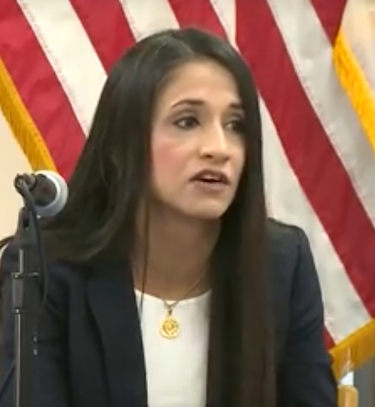Courtrooms are empty while arraignments are conducted virtually
ALBANY COUNTY — Courts are still open during New York’s “pause” to stem the spread of the coronavirus, but they are working virtually.
The Albany County Court has been designated as a hub for most arraignments, according to County Alternate Public Defender Tina Sodhi, who spoke at Thursday’s county press briefing.
“We have a system set up,” she said. “Everything is being done virtually.” Some local courts are also handling arraignments through Skype, she said.
An arraignment is when someone charged with a crime, a defendant, is formally read the charges and, in response, enters a plea.
“Nobody is physically going to court,” Sodhi said. A skeletal crew at the courthouse handles paperwork.
People who are arrested are held at Albany County’s jail. “Sheriff Apple has graciously agreed to set up an area there where Skype could be conducted,” she said.
Albany County Sheriff Craig Apple has been “a huge advocate” of doing arraignments virtually, said the county’s executive, Daniel McCoy, because it saves transportation — bringing prisoners from jail to the courthouse and often back again. “It saves money and it makes sense,” said McCoy.
Prosecutors and defense attorneys along with judges no longer gather in a courtroom for an arraignment but rather each works from his or her own home or office, connecting through Skype.
Not standing next to a client in court, said Sodhi, “is a little difficult for us; however, it’s being done.”
In the last eight weeks, certain crimes have decreased, such as petit larcenies because malls are closed and drug charges because police are making fewer traffic stops, said Sodhi.
“The grand jury is shut down,” she said, so there are no sealed indictments.
“We are getting still a decent amount of felonies,” she said, naming weapons charges and burglaries although there are fewer robberies.
There are also more domestic incidents. “These are hard times,” Sodhi said. “Emotions are high so we are all stuck home with our families. As much as we love them, they do get on our nerves. And sometimes, when emotions are high, we end up saying stuff or doing something that shouldn’t happen and the police get called.”
With domestic violence, orders of protection are often needed. “So arraignments do happen 24/7; attorneys are on call 24/7 from the public defender’s office and from my office. We get an opportunity to speak to our client … prior to going forward with their arraignment.”
Sodhi said she does not know how long the courts will function like this. “We get a new directive on a weekly basis, based on what the governor is trying to do and what the chief judge tells us,” she said of Janet DiFiore.
Courtrooms typically have a lot of people, Sodhi noted, making maintaining social distance a problem so she anticipates it will be “quite some time” before courts resume their formerly normal practices.
“It’s up to the chief judge and the governor how many proceedings and what kinds of proceedings and hearings can go forward,” said Sodhi.
She concluded, “I don’t anticipate us doing trials virtually but I do anticipate we will handle more matters … via Skype.”



